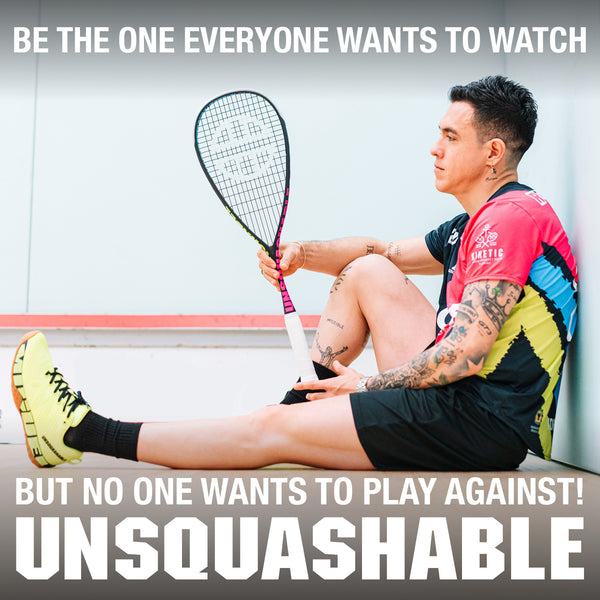Coaching leadership in squash by David Campion
May 15 2022

Squash coaches have a thirst for knowledge on technique and the tactical side of the game. It’s one of the first things a budding level 3 candidate will ask about on a coaching course or workshop. Crucially important yes, however have they considered how they will impart this new-found knowledge onto their learner and ‘effect change’.
The art of coaching is increasingly about how you will take someone on a journey and effect change, which is far more transformational than a simple transaction, i.e. ‘you pay me for the weekly hour lesson, and I will give you some information.’
The leadership and behaviours that you display as a coach are equal to, if not more important than what you know about the game itself. Creating an environment that facilitates self-sufficient players who can take responsibility, and through your teachings have a thirst for learning, is far more powerful than simply giving them all the answers. The old Chinese proverb says it all; “Give a man a fish and you`ll feed him for one day. Teach a man to fish, and you`ve fed him for a lifetime”.
John Wooden, one of the most successful basketball coaches ever, wrote a book titled “You haven’t taught until they have learned”. This a great book for any coach of any level.
How do I create this type of learning environment, and how do I lead through my coaching to ensure my teachings are fully embedded?
Praise Effort
Applying yourself has nothing to do with ability/talent. It`s the minimum requirement. Yes, you need talented players, but I’ve yet to see a top sportsperson make it to the highest level on raw materials alone. Being rewarded for effort promotes a growth mindset which is essential for self-improvement. There is a fantastic book all about Growth v Fixed mindset by Carol Dweck.
Lasting Sustainable Change
Promote an understanding of the benefits and consequences of everything you are asking a player to do. If a player understands the value in doing consistent strength work for example, which allows them to be more powerful in and out of the front corners, they will most likely do it. If they are simply told to do it without the understanding of why, the chances are they will avoid it unless you are stood over them. Equally the consequences of not doing it, will probably lead to injury and a lack of stability/power and so on. Players need to understand that.
Lasting, sustainable change will only happen if the player is motivated to do so. They don`t always have to enjoy doing a particular session, just what it leads to. What benefits it will give them versus what the consequences if they don`t? Players need to understand the value of whatever it is they are working on. This applies to anything on or off court that will help them become a better player.
Show - Tell - Discuss - Ask - Allow
There are times where you might need to demonstrate to your player, tell them how, discuss/collaborate, ask questions to check for understanding and allow them to get on with it.
If you really want to embed some new information, they need to be able to show you or explain it, or else how do you know that its embedded? Where is the energy coming from… is it you sounding off or is your player actively involved in the learning process? Who do you have in front of you and how best do they take information on board?
A Safe Non-Judgemental Environment
It`s ok to make mistakes. Give players the freedom to express themselves. Don`t restrict them - you never know, they might just come up with something new and take the game to another level. It happens!
Allow players to fail – this stimulates problem solving, intrinsic feedback, and raises self-awareness.
Invest
Invest in your players as a person - take time getting to know them. Remember that it isn’t a transaction, you are invested in them and their journey. Take time and effort to build the relationship. Why would someone follow you if they know you are not invested in them? The payback is commitment and loyalty. Ultimately that’s what you want, a committed, loyal player… there`s nothing that beats that!
Build Confidence
Build confidence in a player in how it feels when they strike a ball, so it becomes intrinsic.
If it feels good, and they know why it felt good, the chances are they will be able to repeat it. Players can hit good looking shots but play them badly. Confidence comes from assurance.
Knowing that you can play that shot well and repeatedly will give you huge amounts of confidence, even more so under pressure. It`s how it feels on the inside, not how it looks to everyone else that matters.
Focus on a players development as opposed to results
Winning and losing is a bi-product of what you do on a daily basis. Focus on what a player needs to do that is specific to them - if the process is right the results will come.
Control the controllables and don’t waste time worrying about external factors that are out of your control. Work backwards from your goals and specify on a needs basis what you need to develop and who can help.
High Support/High Challenge
You do need to challenge players but equally offer support to help them find solutions.
Challenge without support can become quite negative/destructive and spiral downwards very quickly.
Be constructive.
Complicated things need to be simple - don’t complicate simple things
The simple things in life are usually the best! – very true when it comes to repeating technique for example.
If it’s complicated, chances are it will break down under pressure. You can apply this to most things, keep it simple and don’t overcomplicate. As the All Blacks say, “We simply do the basics brilliantly”.
These are just a few examples of how a coach can create a transformational environment that will help a player maximise their potential and it has nothing to do with ability!
The art of coaching is increasingly about how you will take someone on a journey and effect change, which is far more transformational than a simple transaction, i.e. ‘you pay me for the weekly hour lesson, and I will give you some information.’
The leadership and behaviours that you display as a coach are equal to, if not more important than what you know about the game itself. Creating an environment that facilitates self-sufficient players who can take responsibility, and through your teachings have a thirst for learning, is far more powerful than simply giving them all the answers. The old Chinese proverb says it all; “Give a man a fish and you`ll feed him for one day. Teach a man to fish, and you`ve fed him for a lifetime”.
John Wooden, one of the most successful basketball coaches ever, wrote a book titled “You haven’t taught until they have learned”. This a great book for any coach of any level.
How do I create this type of learning environment, and how do I lead through my coaching to ensure my teachings are fully embedded?
Praise Effort
Applying yourself has nothing to do with ability/talent. It`s the minimum requirement. Yes, you need talented players, but I’ve yet to see a top sportsperson make it to the highest level on raw materials alone. Being rewarded for effort promotes a growth mindset which is essential for self-improvement. There is a fantastic book all about Growth v Fixed mindset by Carol Dweck.
Lasting Sustainable Change
Promote an understanding of the benefits and consequences of everything you are asking a player to do. If a player understands the value in doing consistent strength work for example, which allows them to be more powerful in and out of the front corners, they will most likely do it. If they are simply told to do it without the understanding of why, the chances are they will avoid it unless you are stood over them. Equally the consequences of not doing it, will probably lead to injury and a lack of stability/power and so on. Players need to understand that.
Lasting, sustainable change will only happen if the player is motivated to do so. They don`t always have to enjoy doing a particular session, just what it leads to. What benefits it will give them versus what the consequences if they don`t? Players need to understand the value of whatever it is they are working on. This applies to anything on or off court that will help them become a better player.
Show - Tell - Discuss - Ask - Allow
There are times where you might need to demonstrate to your player, tell them how, discuss/collaborate, ask questions to check for understanding and allow them to get on with it.
If you really want to embed some new information, they need to be able to show you or explain it, or else how do you know that its embedded? Where is the energy coming from… is it you sounding off or is your player actively involved in the learning process? Who do you have in front of you and how best do they take information on board?
A Safe Non-Judgemental Environment
It`s ok to make mistakes. Give players the freedom to express themselves. Don`t restrict them - you never know, they might just come up with something new and take the game to another level. It happens!
Allow players to fail – this stimulates problem solving, intrinsic feedback, and raises self-awareness.
Invest
Invest in your players as a person - take time getting to know them. Remember that it isn’t a transaction, you are invested in them and their journey. Take time and effort to build the relationship. Why would someone follow you if they know you are not invested in them? The payback is commitment and loyalty. Ultimately that’s what you want, a committed, loyal player… there`s nothing that beats that!
Build Confidence
Build confidence in a player in how it feels when they strike a ball, so it becomes intrinsic.
If it feels good, and they know why it felt good, the chances are they will be able to repeat it. Players can hit good looking shots but play them badly. Confidence comes from assurance.
Knowing that you can play that shot well and repeatedly will give you huge amounts of confidence, even more so under pressure. It`s how it feels on the inside, not how it looks to everyone else that matters.
Focus on a players development as opposed to results
Winning and losing is a bi-product of what you do on a daily basis. Focus on what a player needs to do that is specific to them - if the process is right the results will come.
Control the controllables and don’t waste time worrying about external factors that are out of your control. Work backwards from your goals and specify on a needs basis what you need to develop and who can help.
High Support/High Challenge
You do need to challenge players but equally offer support to help them find solutions.
Challenge without support can become quite negative/destructive and spiral downwards very quickly.
Be constructive.
Complicated things need to be simple - don’t complicate simple things
The simple things in life are usually the best! – very true when it comes to repeating technique for example.
If it’s complicated, chances are it will break down under pressure. You can apply this to most things, keep it simple and don’t overcomplicate. As the All Blacks say, “We simply do the basics brilliantly”.
These are just a few examples of how a coach can create a transformational environment that will help a player maximise their potential and it has nothing to do with ability!







